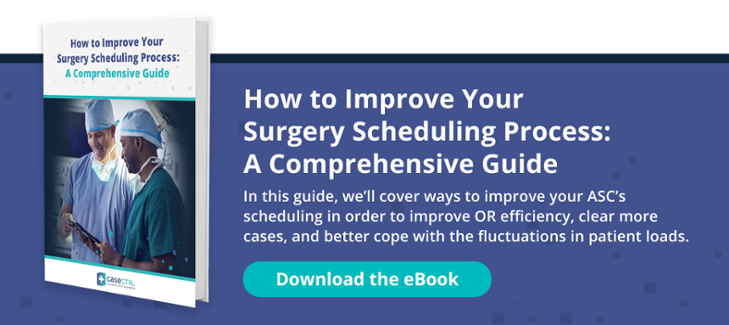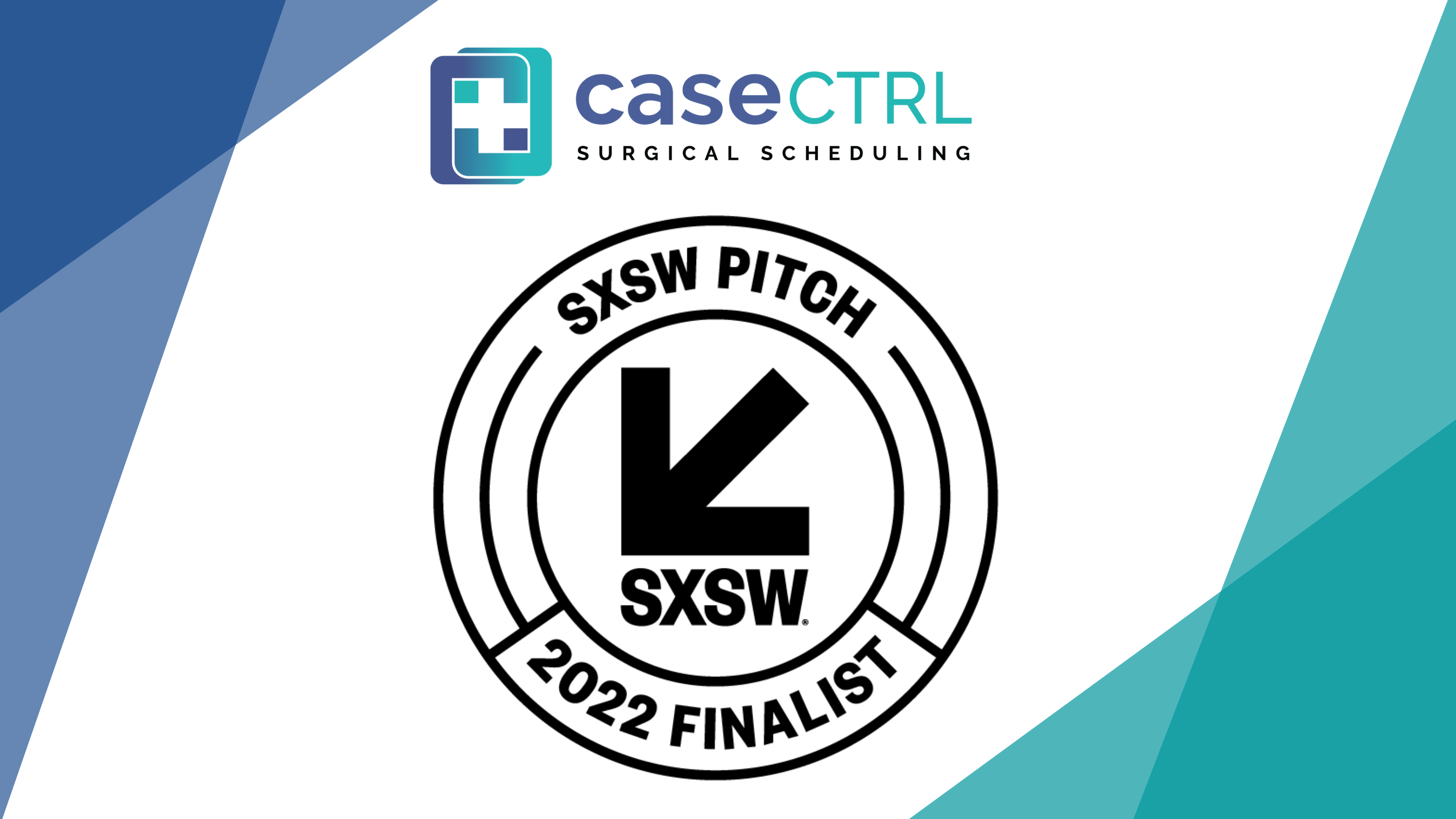Has business as usual at your ASC or hospital been more difficult during the pandemic? For many, the inconveniences of disorderly scheduling and candidate management practices have become amplified during this time. According to July Consumer Medical Data, elective surgeries were down 65 percent from March to April, compared to the same period in 2019. As these surgeries have returned to the calendar, with an average wait time of four months, the need to eliminate the chaos of manual-entry surgery scheduling processes has become even more important than ever.
ASCs are booming in general, offering affordable and efficient alternatives to hospitals. In fact, in an October 2020 Becker’s article, Jim Freund, senior partner at ASCs Inc., states, “We have truly seen a paradigm shift away from hospital-based procedures to the ASC setting, and Covid-19 has acted as yet another catalyst.” Unlike hospitals, ASCs have not been hamstrung by government mandates to preserve resources for coronavirus surges.
This is further catalyzing a shift towards the ASCs that can continue to deliver care during these unprecedented times. According to a report from Bain Consulting, case volume growth in the ASC industry overall is projected to reach 6 to 7% over each of the next three years. ASCs are performing half of all outpatient surgeries in the U.S. at significantly lower costs. By 2021 the surgeries performed are expected to value around $44 billion. As caseloads increase, EHRs grow more tedious, and patient satisfaction becomes a larger part of clearing cases, physicians and schedulers will be overwhelmed if they don’t change. Implement effective surgery scheduling guidelines now to benefit from future market growth and streamline your workflow.
Here are six surgery scheduling guidelines to focus on as you improve your scheduling process for profitability—without sacrificing patient care.
Unburden Physicians From Scheduling-Related “Paperwork”
Physicians spend more time than ever before logging data manually to interface with referring hospitals/physicians, insurance companies, and CMS, and to remain HIPAA compliant.
A Medscape Physician Compensation Report 2018 found that 70 percent of physician respondents (20,000, across 30 specialties) said that they spent 10 hours or more weekly on paperwork and administrative tasks--that was 13% higher than 2017. EHRs and disjointed software programs have not solved the issue as they are not coordinated and not aimed at the efficient flow of surgery candidates toward completed claims. One surgeon may operate at three facilities, each with their own independent medical record systems and scheduling process.
Did you know it takes at least 150 data points to effectively communicate a surgical plan in order to successfully optimize the scheduling of that surgery? Some centers are even still using paper surgery scheduling forms. This takes precious time from doctors, schedulers, and patients. While all electronic or filing tasks can seem equally weighted, a software program geared toward scheduling surgery candidates and anticipating changes helps schedulers to prioritize the various data points.
1. Empower Schedulers by Sharing Their Knowledge
Schedulers are juggling multiple issues for multiple physicians all of the time—five or more surgeries in a day for several different specialties. Equipment can be misdelivered, and redundant information sharing (backtracking to find manually compiled data) can muddle incoming details. Software solutions can give schedulers the power to do more, and it can also spread their knowledge to others who don’t have easy access to their information so that teams can work as a flexible unit—the essence of good surgical management.
2. Improve Claims Success Rate
According to a 2020 Medscape Physician Compensation Report, 18% of orthopedic surgery claims are never recovered. Why? Sometimes candidates just get lost in the paper trail, while other instances are due to miscommunicated data. A scheduling process can be strengthened by automating all of the predictable elements of a case. Are you currently making sure to go through all the steps of patient pre-authorization? Is there a system monitoring the number of claims cleared over a given time? Rote aspects of client communication can be generated by an adjunct software program to lessen patient confusion about financial responsibility and provide resources when appropriate.
3. Analyze the Blocks
Operating rooms can cost more than $20 per minute when unused, not to mention the opportunity costs of the value of work that could be done. Block scheduling helps physicians manage their time if they are adjusted to the emerging realities of the practice. Are you tracking the following key factors in scheduling blocks?
- Length of each surgery: Block time can be wasted if it over or underestimates surgery times, including the room turnover. Your records can help you judge whether or not your blocks are ideal. You might also consider how those blocks may be useful to other surgery types when open.
- Lead time of patients: If it takes three months to set up a knee replacement, block time that is not adequately full can be made “open” to other surgeries that may not have as much lead time. Schedulers need a way to constantly look for useful blocks to open and coordinate with physicians.
- Groupings of specialties and procedures: Generally, surgeons would prefer similar procedures to be grouped consecutively. Make sure your team accounts for the recovery time of typical procedures based on data. Those with higher variability, in general, might be placed earlier in a day to make adjustments thereafter. Knowing the level of equipment reorganization and required staff can also help schedulers decide how procedures fit together best.
Effective scheduling systems give surgeons simple ways to analyze their utilization of blocks. Most ASC physicians have a vested interest in performing as many surgeries as possible. If you can monitor the specific administrative hurdles that affect their work, you may be able to help them free up time.
4. Make Clear External Communication a Priority
Simple lapses in communication can derail otherwise refined surgical management.
According to a 2013 Merck study, 93% of anesthesiologists and 86% of nurse anesthetists reported that communication with surgeons impacts their ability to manage anesthesia plans. Schedulers should build in time to make sure the two parties can establish a shared understanding of the plan for each procedure.
Cancelled surgeries can result from poor communication with the referring physician or the patients themselves. Many important messages to patients can be automated with software programs that manage candidates.
Finally, make sure communication with outside vendors of equipment and supplies for surgeries (and new COVID PPE concerns) is consistent and accurate.
5. Seal the Cracks
The final surgery scheduling guideline encompasses the small, but persistent ways that OR time disappears or goes unused, the cracks.
- Prospects: In the midst of cancellations and reschedules, schedulers can lose focus on prospects from referring physicians or those who have delayed an elective surgery for reasons which could have long passed. Schedulers can think of the need to have a Client Relationship Management or CRM-like system for tracking relationships with surgery candidates.
- Turnover: Scheduling depends on accounting for consistent room and staff turnover between procedures. Once baselines are established for a given procedure, individual elements can be analyzed for their impact. Perhaps there is a lag in communication between departments—pre-op, OR, PACU. If it is taking too long to rearrange rooms, you may look back to blocking effectiveness, or perhaps a floating member of the staff can help better prepare the OR for turnover.
- Admissions: Analyze the admissions protocol of your center to make sure there are no redundant or irrelevant tests taking place. This is also a place where patient education may reveal itself as inadequate.
- Punctuality: Are supporting staff and physicians arriving in time to prepare for procedures? What about patients? Are mechanisms in place to confirm appropriate arrivals for patients on the day of surgery? Having people in place in one thing, but having information organized for them at the same time can be especially difficult.
Many of the threats to profitability ASCs point toward a need for improved efficiency through meeting surgery scheduling guidelines. The sheer number of data points and limited staff of ASCs, however, makes interpreting that data difficult. Further, even when you know the culprits, enacting a streamlined scheduling process means you either need extra employees with their eyes on candidates, equipment vendors, physician notes, and patient communications, cancellations, etc.—or a software solution that consolidates these scheduling processes in one place that is easy to access for all.
If you are looking for a way to improve your ASC’s scheduling in order to clear more cases and better cope with the fluctuations in patient loads, now is a great time to retool. CaseCTRL is a Saas platform to manage the entire surgical case pipeline that can integrate with your exsiting ASC or hospital EMR. Most importantly, this software enables shared data that is easily accessible and extracted for analysis. Contact CaseCTRL to learn how to empower schedulers to work and share more efficiently, while physicians can spend more time with patients. Less paperwork, redundancy, confusion, and stress means a more profitable ASC.







































